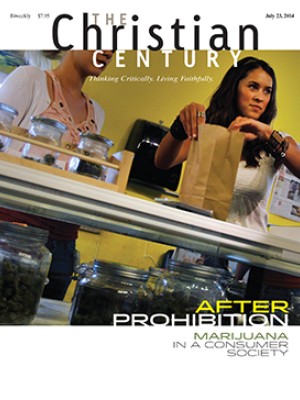Sunday, July 27, 2014: Matthew 13: 31-33; 44-52
Six words of scripture always transport me to an amazing place: “The kingdom of heaven is like . . .”
All it takes is three bars of Mozart. I’m dozing in my chair with music playing in the background when all at once I wake up, maybe even sit bolt upright. Suddenly I’m on safari with Robert Redford and Meryl Streep. I’m managing a coffee plantation; I’m shooting lions. I’m lounging over dinner in a glorious landscape with monkeys watching the turntable of an old record player. I’m flying over the Rift Valley in the early days of aviation, seeing people and animals, mountains and plains from a perspective rarely glimpsed by human eyes. The world of Out of Africa has claimed me, and the opening notes of Mozart’s Concerto for Clarinet in A Major took me there.
Ever since my seminary days, six words of scripture transport me to a landscape just as amazing. I hear Matthew’s “The kingdom of heaven is like . . .” and I pay attention. These words pique my imagination. They signal that what’s coming is far different from the place my spirit goes when hijacked by entertainers or advertisers.
Read our latest issue or browse back issues.
So I let myself be transported to a new world once again via the lean similitudes tucked into Matthew 13. I let mustard seed, leaven, hidden treasure, a pearl, a dragnet, and a householder act as portals. As I enter these parables of Jesus, I remind myself to stay in a right-brained mode, to laugh at incongruities, to refuse to allegorize. I remind myself to approach the parables as playfully as possible, with a receptive spirit. I don’t want to interpret such lovely, tiny gems; I want to wonder about them. I want to open myself to the strange territory these analogies from Palestinian life point to.
With the mustard seed and the leaven, my supposed familiarity could lull me into inattention. So I let Jesus the storyteller push me off balance once again with his provocative twists. After all, the mustard plant is considered a weed despite its medicinal qualities. And in the Bible, leaven is often seen as a corrupting influence, as in the leaven of the scribes and Pharisees.
As a spiritual director and occasional preacher, I pray for eyes to glimpse the hidden, sometimes startling ways the kingdom of heaven is already present. I pray for insight to see the familiar territory of my own life and community with reign-of-God eyes. I look for signs of mustard seeds germinating and for the smell of yeast leavening, trusting that such processes will manifest themselves, maybe even become too obvious to miss. I realize suddenly that these parables are drawing me in, addressing me at deep places of yearning.
In the second set of analogies, I participate in the joy of the peasant who finds hidden treasure buried in a field. I wonder what radical action such joy might inspire in me. I’m struck by the pearl merchant’s risk taking, and I think of stories of pearl divers risking lungs and life. I recall early Eastern Christian writings that speak of the incarnation as a pearl and Jesus as a pearl diver, and I marvel at the risks he took to bring God’s reign near.
My mind wanders to individuals, groups, and movements motivated to step into danger and stay there to gain something deemed valuable. If Canadian astronaut Chris Hadfield devotes his life single-mindedly to space exploration, if Nepali Sherpas risk their lives so Western adventurers can climb Mount Everest, if rescuers dive in unstable conditions to search for survivors of a sunken ferry, what about me? I remember a visit to Rankin House in Ripley, Ohio, one of the stations on the Underground Railroad network. There Presbyterian minister John Rankin and his family hid many of the 2,000 escaping slaves who crossed the Ohio River. The family took pride in having never lost a passenger.
I wonder what risky action I’d be willing to pursue if I stepped far enough into these parables’ strange landscape and lingered there long enough to let hope claim me. The mustard seed and the leaven, the hidden treasure and the pearl—in the end, these are pictures of hope. I long for my inner eyes to notice where God’s reign is hidden in the midst of everyday life. I long to trust its transforming effect as surely as I trust yeast to transform dough—to pray the words “your kingdom come, your will be done on earth as it is in heaven” without being tempted by cynicism.
The parable of the dragnet makes me laugh at my tendency to feel too much responsibility when I do rouse myself to action. If those fisherfolk are willing to pull in all sorts of fish indiscriminately and sort them out later, maybe I can let God take care of whatever sorting is needed in God’s own time.
At the end of this week’s Gospel reading, Jesus asks his disciples, “Do you get it?” They say they do. Perhaps the similitude that follows is the most potent of them all. I’m awed by the notion of being trained for the kingdom, of being a custodian of such treasure. This requires of me faithful, accessible transmission. It requires the ability to glimpse what is hidden, the discernment to know which of the treasures of God’s household to offer when. It surely requires my own commitment to the justice, mercy, and hope God intends for our world.
I’m grateful to these six words from Matthew that transport me to the playful, provocative world of the parables, with their deceptively simple pictures of the reign of God brought near. And I’m grateful for the tiny similitudes tucked into Matthew 13. They enable me to enter and proclaim a grace-infused world of hope brought near.






